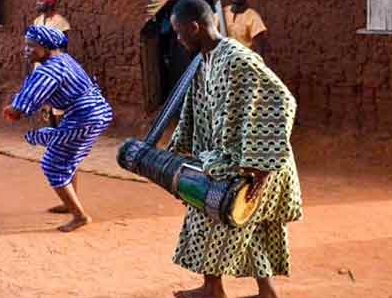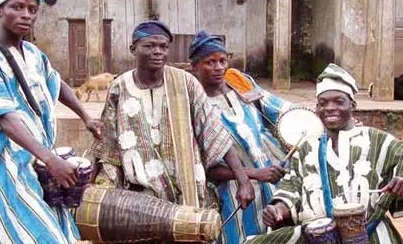
support@yorubalibrary.com
+2348073529208, 07038599574

Yoruba music, with its unique rhythms and rich cultural expressions, has significantly influenced global music. This article explores the roots of Yoruba music, its traditional forms, and its widespread impact across various genres worldwide.
Origins of Yoruba Music
Yoruba music originates from the Yoruba people of southwestern Nigeria. It is deeply intertwined with the cultural, religious, and social life of the Yoruba community. Traditional Yoruba music often accompanies rituals, celebrations, and everyday activities.
Traditional Instruments
Yoruba music features a variety of traditional instruments, including drums, flutes, and stringed instruments. The most notable are the talking drums (dùndún and bàtá), which can mimic the tones and rhythms of Yoruba speech, allowing them to convey messages and stories.
Musical Forms
Traditional Yoruba music encompasses various forms such as ceremonial music, folk songs, and religious hymns. These forms often involve complex rhythms, call-and-response patterns, and expressive vocal techniques.
Yoruba Music in the Diaspora
The trans-atlantic slave trade played a pivotal role in spreading Yoruba music across the Americas and the Caribbean. Enslaved Yoruba people carried their musical traditions with them, blending with local music to create new genres.
Influence in the Americas
In countries like Brazil, Cuba, and Trinidad, Yoruba musical elements fused with local traditions to form genres such as Samba, Candomblé, and Santería music. These genres retain Yoruba rhythms, instruments, and spiritual elements, reflecting the enduring legacy of Yoruba culture.
Afro-Cuban Music
Afro-Cuban music, heavily incorporates Yoruba influences. The use of Yoruba drums, chants, and religious practices is evident in the music, dance, and rituals of Afro-Cuban communities.
Yoruba Music in Contemporary Genres
Yoruba music continues to shape contemporary music genres, from Afrobeat to hip-hop, jazz, and beyond. Many modern musicians draw inspiration from Yoruba rhythms, instruments, and vocal styles.
Afrobeat
Afrobeat, pioneered by Nigerian musician Fela Kuti, blends Yoruba music with jazz, funk, and highlife. This genre emphasizes polyrhythmic percussion, call-and-response vocals, and socio-political themes, making it a powerful medium of expression.
Jazz and Blues
Yoruba music has also influenced jazz and blues. Renowned jazz musicians like John Coltrane and Herbie Hancock have incorporated Yoruba rhythms and themes into their compositions. The blues genre, rooted in African American experiences, reflects Yoruba musical structures and expressions.
Hip-Hop and Pop
In the realm of hip-hop and pop, artists like Dagrin, Olamide and Wizkid have brought Yoruba music to global audiences. Their music, infused with Yoruba language, rhythms, and cultural references, resonates with listeners worldwide.
Global Recognition and Collaborations
Yoruba music has gained international recognition through collaborations between Yoruba artists and global musicians. These partnerships have furthered the reach and appreciation of Yoruba music.
Festivals and Awards
Yoruba music is celebrated in international festivals such as the Lagos Jazz Series and the Felabration Festival. These events attract global audiences, showcasing the vibrancy and diversity of Yoruba music.
Preserving and Promoting Yoruba Music
Efforts to preserve and promote Yoruba music are essential for maintaining its cultural significance and global influence. Initiatives include music education programs, cultural exchanges, and digital platforms.
Music Education
Educational programs in Nigeria and the diaspora aim to teach young generations about Yoruba music. These programs ensure the transmission of traditional knowledge and skills, fostering a deeper appreciation for Yoruba heritage.
Cultural Exchanges
Cultural exchanges between Nigeria and other countries promote mutual understanding and respect for Yoruba music. These exchanges involve performances, workshops, and academic research, enriching the global musical landscape.
Digital Platforms
Digital platforms such as YouTube, Spotify, and Apple Music have made Yoruba music accessible to global audiences. These platforms enable artists to share their work widely, reaching new fans and preserving their musical heritage.
Conclusion
Yoruba music's influence on global music is profound and far-reaching. From traditional forms to contemporary genres, Yoruba rhythms, instruments, and cultural expressions continue to inspire and captivate audiences worldwide. Preserving and promoting Yoruba music ensures its enduring legacy and celebrates the rich cultural heritage of the Yoruba people.

The unique styles of Yoruba Bata and Dundun dances…

The emergence of new age social media and impact i…